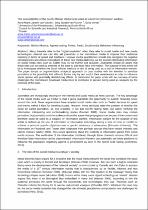 ResearchSpace
ResearchSpace
The susceptibility of the South African Media to be used as a tool for information warfare
JavaScript is disabled for your browser. Some features of this site may not work without it.
- ResearchSpace
- →
- Research Publications/Outputs
- →
- Conference Publications
- →
- View Item
| dc.contributor.author |
Jansen van Vuuren, A

|
|
| dc.contributor.author |
Jansen van Vuuren, J

|
|
| dc.contributor.author |
Venter, S

|
|
| dc.date.accessioned | 2012-11-29T12:59:30Z | |
| dc.date.available | 2012-11-29T12:59:30Z | |
| dc.date.issued | 2012-07 | |
| dc.identifier.citation | Jansen van Vuuren, A, Jansen van Vuuren, J and Venter, S. The susceptibility of the South African Media to be used as a tool for information warfare. Proceedings of the 11th European Conference on Information Warfare and Security, Laval, France, 5-6 July 2012, pp 127-134 | en_US |
| dc.identifier.isbn | 978-1-908272-55-3 | |
| dc.identifier.isbn | 978-1-908272-56-0 | |
| dc.identifier.uri | http://hdl.handle.net/10204/6386 | |
| dc.description | Proceedings of the 11th European Conference on Information Warfare and Security, Laval, France, 5-6 July 2012 | en_US |
| dc.description.abstract | Many theorists refer to the "digital revolution" when they refer to social media and new media technologies. Internet use can also aid journalists in the mainstream media to improve their traditional reporting in terms of speed and feedback. However media practitioners should also recognize the negative consequences and ethical implications of these new media platforms, as the sources distributing information on social media sites such as Twitter may not be truthful and accurate. Journalists should be aware that these sites can be used by enemies of the state to distribute false information. The purpose of this article will be to investigate whether the South African media is at risk of being used as a tool for information warfare. The paper adopts an argumentative analytical approach on case studies with the intention to sensitize journalists to the possibility that different forces may try and exploit their weaknesses in order to influence social opinion with potentially destabilizing effects. In conclusion the paper ends with an overview of some challenges the mainstream broadcast media have to overcome to prevent being used as weapons by the enemies of the state. | en_US |
| dc.language.iso | en | en_US |
| dc.publisher | Academic Conferences Limited | en_US |
| dc.relation.ispartofseries | Workflow;9922 | |
| dc.subject | Media influence | en_US |
| dc.subject | Agenda-setting | en_US |
| dc.subject | en_US | |
| dc.subject | Radio | en_US |
| dc.subject | Social media | en_US |
| dc.subject | Behaviour influencing | en_US |
| dc.title | The susceptibility of the South African Media to be used as a tool for information warfare | en_US |
| dc.type | Conference Presentation | en_US |
| dc.identifier.apacitation | Jansen van Vuuren, A., Jansen van Vuuren, J., & Venter, S. (2012). The susceptibility of the South African Media to be used as a tool for information warfare. Academic Conferences Limited. http://hdl.handle.net/10204/6386 | en_ZA |
| dc.identifier.chicagocitation | Jansen van Vuuren, A, J Jansen van Vuuren, and S Venter. "The susceptibility of the South African Media to be used as a tool for information warfare." (2012): http://hdl.handle.net/10204/6386 | en_ZA |
| dc.identifier.vancouvercitation | Jansen van Vuuren A, Jansen van Vuuren J, Venter S, The susceptibility of the South African Media to be used as a tool for information warfare; Academic Conferences Limited; 2012. http://hdl.handle.net/10204/6386 . | en_ZA |
| dc.identifier.ris | TY - Conference Presentation AU - Jansen van Vuuren, A AU - Jansen van Vuuren, J AU - Venter, S AB - Many theorists refer to the "digital revolution" when they refer to social media and new media technologies. Internet use can also aid journalists in the mainstream media to improve their traditional reporting in terms of speed and feedback. However media practitioners should also recognize the negative consequences and ethical implications of these new media platforms, as the sources distributing information on social media sites such as Twitter may not be truthful and accurate. Journalists should be aware that these sites can be used by enemies of the state to distribute false information. The purpose of this article will be to investigate whether the South African media is at risk of being used as a tool for information warfare. The paper adopts an argumentative analytical approach on case studies with the intention to sensitize journalists to the possibility that different forces may try and exploit their weaknesses in order to influence social opinion with potentially destabilizing effects. In conclusion the paper ends with an overview of some challenges the mainstream broadcast media have to overcome to prevent being used as weapons by the enemies of the state. DA - 2012-07 DB - ResearchSpace DP - CSIR KW - Media influence KW - Agenda-setting KW - Twitter KW - Radio KW - Social media KW - Behaviour influencing LK - https://researchspace.csir.co.za PY - 2012 SM - 978-1-908272-55-3 SM - 978-1-908272-56-0 T1 - The susceptibility of the South African Media to be used as a tool for information warfare TI - The susceptibility of the South African Media to be used as a tool for information warfare UR - http://hdl.handle.net/10204/6386 ER - | en_ZA |





